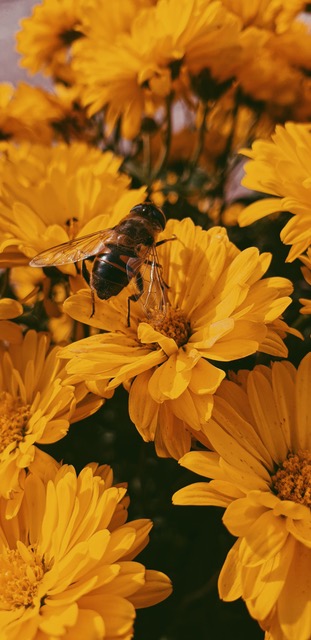
We’ve all seen the headlines: bees are dying!
Bees and other pollinators are vital to life. Bees pollinate 80% of flowering plants. They account for $15 billion in agricultural products; bees shape our food chains. The good news is that commercial bee keeping has stabilized over the past decade. The bad news is that “wild” or natural bees continue to decline.
Why are bees dying? The reasons are many but the bottom line is that when the environment around bees (the ecosystem) is changed then bees will die. Here are a couple of examples. Home gardeners are often more attracted to exotic plants and hybrid species than the native local plants that bees feed upon. Take away the natives and bees find it harder to live.
The pesticides we use to encourage plant growth and keep our lawns green are anathema to bees. They take the poisonous substances back to their hives and it spreads throughout the colony. When we artificially disrupt the ecosystem death follows.
God’s creation is a thriving ecosystem of interconnectedness and interdependence. The life and death of bees is only one example of how life is interconnected within this community. Healthy ecosystems provide a balance of life and nutrients to maintain the health of those within the system.
What does this have to do with disciplemaking? Like creation, God has designed disciplemaking to be like an ecosystem — a relationship of many inter-connecting parts.
The New Testament uses another analogy — the body — to illustrate this principle. The body has many members, writes the Apostle Paul, but all these members make up one body (1 Cor 12:12). Both feet and hands, eyes and ears, belong to the body (1 Cor 12:14-17). If one part of the body hurts all the other parts are affected (1 Cor 12:26). There’s an interconnectedness between each member of the body; each member cares for the other members because all members are important (1 Cor 12:25). The body is an ecosystem of differing parts which influence and shape the others.
What happens if we view disciplemaking as God’s ecosystem?
- Disciplemaking becomes a team sport and not a singles match. I love the principle in Ephesians 4:16 — maturity happens when “each part (of the body) does its work” (NIV). Many forms of disciplemaking focus on one individual helping another individual. This personal approach is necessary, but an ecosystem provides so much more. In the individualistic approach, there’s a subtle reliance on the disciple maker being the all-sufficient avenue of growth. Time has taught me that I can’t be the primary growth provider in disciplemaking. When I’m the sole provider, people come away stunted in their prayer lives and inadequate in evangelism — two on-going challenges for me. I’m glad disciplemaking is a team sport that covers my inadequacies!
- Disciplemaking becomes richer and multi-dimensional. Our Lord wants to enrich lives through the many and not just the one. When I first became involved with The Navigators, we were encouraged at conferences or meetings to “get time” with the speaker or other leaders. “Getting time” was an expression to learn from others. If disciplemaking is primarily an individualistic enterprise then along with the disciplemaker’s strengths, we pick up his or her preferences, peculiarities, and perspective. An ecosystem of growth connects us with the diversity of gifts and personalities within the body. We move from the single dimension of one person’s influence to the rich textures of many influencers.
- Disciplemaking becomes a sustainable activity. Sustainability is a current environmental concern. There’s a fear that as our natural resources decline or become disrupted then we will not be able to maintain life at its current rate or level. Just as creation can be depleted so we can be depleted and lose sustainability.
God has designed seasons and sabbaths to maintain health. Seasons tell us that growth is cyclical and not continuous; sabbaths remind us that we’re not in charge (our Lord is!). Disciplemaking taxes and depletes our emotional and spiritual selves. When we practice seasons and sabbaths, we refresh and refill the depletion of our emotional, mental, and physical energies. These practices not only sustain us but give health to future generations of disciples. I wish I would have learned this principle years ago!
What do bees have to do with disciplemaking? Like bees, we need healthy spiritual ecosystems. Here are three questions I’m asking myself about discipling within God’s ecosystem.
- Is my practice of disciplemaking a singles match or a team sport?
- How is my disciplemaking adding the rich faith texture of others that counters my individual preferences, peculiarities, and perspective?
- Am I building a sustainable personal and local ecosystem so that future generations are nurtured in a healthy spiritual culture?
The next time you see a honey bee or use honey in your tea, think disciplemaking and thank God for His design of ecosystems.


Leave a Reply